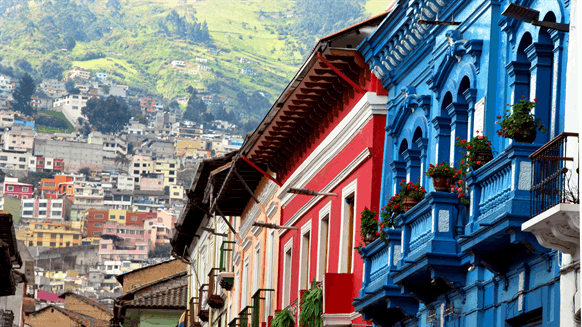While investors are focused on Ecuador’s tumultuous presidential election, two other measures on the ballot in the August 20 vote will also shape the country’s financial future.
Ecuadorians are expected to vote in favor of referendums to order the closure of a major oil field and restrict gold and copper mining, which could leave the government with a big hole in its budget. The initiatives come alongside a presidential race that was thrown into chaos last week when one of the leading candidates was killed while campaigning.
A referendum will ask all voters whether to allow oil production to continue in the northeastern corner of Yasuní National Park in the Amazon region. State-controlled Petroecuador produces about 55,000 barrels a day from the field, equivalent to about 15% of its total crude output.
The other referendum will ask voters in the Quito metropolitan area whether authorities should stop granting permits in a 480-square-mile stretch known as the Andean Choco northwest of the capital. The area is believed to contain large deposits of gold and copper, but is also home to wildlife such as toucans and spectacled bears.
The referendums will be an important signal to foreign companies of Ecuador’s appetite to take advantage of its vast mineral wealth. Oil is the country’s top export producer, with mining the fourth largest, but many voters are concerned about environmental damage.
Shutting down oil production at the field in question will cost the government about $1.25 billion in annual tax losses, equivalent to about 1 percent of gross domestic product, according to an estimate by Petroecuador.
“The bottom line is that losing the referendum on oil production would further complicate budget management for the next administration,” said Siobhan Morden, director of Latin American Fixed Income Strategy at Santander. “It would reaffirm the difficulty of paying the debt in the medium term beyond 2025.”
A poll released on August 12 by Comunicaliza found that 35% of voters want to stop oil drilling in the park, while 25% think it should continue. Another 25% are undecided, while others intend to register a blank vote.
In the mining referendum, around 61% of respondents want to block mining in the area, while 19% want it to continue. Despite a history of informal mining in the Choco area and the promise of jobs for poor rural communities, the ban has strong support from mostly urban voters concerned about the alleged impact on water quality.
Greater scrutiny
The Aug. 9 assassination of presidential candidate Fernando Villavicencio has upended the general election, but Álvaro Marchante, chief executive of Comunicaliza, says there is little sign it will affect the separate referendum questions. Recent polls show opponents of oil and mining are gaining momentum, but that has more to do with their success on the campaign trail, Marchante said in response to written questions.
The votes come amid increased scrutiny of the social and environmental impacts of extractive industries. Neighboring Colombia has banned new oil exploration since President Gustavo Petro took office last year.
Ecuador has long been on the radar of global mining heavyweights such as BHP Group and Rio Tinto Group, and already has a large opencast copper mine and an underground gold mine.
“Communities are divided here,” said Marcia Dután, 45, who makes a living making brown sugar from cane near the town of Pacto, a two-hour drive from central Quito. “Since the parish was founded, the people here have been miners.”
Dután said she is not happy that the capital’s two million voters, rather than the local population, decide the issue.
Great Projects
In a national referendum in February 2018, voters banned mining from nature reserves and urban areas. While industry supporters hoped this would set a precedent in favor of mining elsewhere in the country, activists seized on the decision to pursue local bans. In the previous 2021 election, more than 80% of Conca voters voted to ban new projects.
To be sure, the ban on new permits would not affect a dozen existing exploration projects in the Choco area. Still, a higher court recently agreed with indigenous and environmental groups to suspend the consent procedures established by President Guillermo Lasso. This risks at least delaying the construction of several major projects elsewhere in Ecuador.


